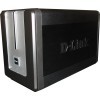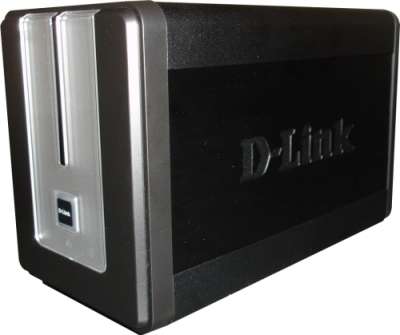- Qualcomm Launches Snapdragon 4 Gen 2 Mobile Platform
- AMD Launches Ryzen PRO 7000 Series Mobile & Desktop Platform
- Intel Launches Sleek Single-Slot Arc Pro A60 Workstation Graphics Card
- NVIDIA Announces Latest Ada Lovelace Additions: GeForce RTX 4060 Ti & RTX 4060
- Maxon Redshift With AMD Radeon GPU Rendering Support Now Available
D-Link DNS-323 NAS

There’s something to be said for convenient, mappable network storage. NAS not only offers an affordable way to keep your data safe, but also a handy way to share all your "stuff". As our review states, this name branded BYOD NAS box delivers on all fronts.
Page 1 – Introduction
As our personal media libraries continue to grow larger and large each day, serious consideration needs to be given to our storage capabilities. With our PCs filling up with personal photos, movies, music and por… more movies, we all have a considerable amount of time invested in our collections. I personally have taken my CDs and ripped them onto my computer at an acceptable bit rate, allowing me to stream them to my Squeezebox in my living room.
With all this time and effort that I put into my digital media, it’s easy to overlook the unstable nature of disk storage. While many disk drives come with impressive warranties, like Seagate’s 320 and 750GB drives we have looked at in the past, this only guarantees that the drive will be replaced in the event of a failure. It in no way suggests that the drive will actually survive the warranted time in its entirety. This is in no way an implication that today’s hard drives are not reliable.
On the contrary, I feel quite comfortable with the drives I currently use and should something ever happen, there is usually more than enough warning when a drive is close to irreversible failure. Adding to this is the large scale availability of this media thanks to the invasion of broadband into our homes.
To address these storage concerns, there are a few ways to ensure that your data is at least safer than it would be if nothing one done at all. One approach, and this is usually the cheapest, is to purchase a separate hard drive and only store media on it. While this will protect your data should a hard drive fail (assuming it’s not the media drive itself) you’re still left being only one step away from disaster.
Another approach is through the use of an external hard drive. We have taken many looks at complete externals and enclosures alike and these have proven to be a simple, fast way to back up your data. The drawbacks to this approach are the lack of disk redundancy as well as the convenience of taking off with the small enclosure. If mobility isn’t a concern, and data redundancy is a must, a simple NAS box might be what you are looking. Earlier this year, we took a look at the Thecus N2100. Offering a slew of features and dual gigabit NICs, the RAID ready NAS fared well in our testing.

For those of you who might not be familiar with the term “NAS,” it’s simply an acronym for Network Attached Storage. Like an external hard drive enclosure, a NAS is simply a storage device that connects directly into a network, be it large or small, in much the same way that an external enclosure connects directly into your PC via a FireWire or USB cable.
One advantage of a NAS is that large amounts of data can be shared across a network without the need for a host PC… similar to adding a networked printer. As more and more people are setting up home networks, various companies have taken up the challenge of creating innovative ways to share crucial data amongst the other network PCs and the product lineup spans the tech tree from top to bottom.
For the simple home users, there are small, single disk NAS devices such as the Vantec NexStar LX that we reviewed not too long ago. As needs and network sizes increase, a users can easily step up to a larger, RAID capable NAS like the Thecus we mentioned earlier. With the ability to work in either RAID 0 for maximum speed or in RAID 1 for unquestionable data security, the Thecus is a versatile device. With these larger, more feature friendly, NAS devices, homes and small business alike have the ability to backup their valuable data to a device that can easily be placed in another area of the house or building for added security.
For the mission critical data, one can step up to larger devices that house four and five hard drives and allow the use of RAID 5. These are ideal for companies that cannot lose any data and keep the company up and running. While this might sound a bit severe, it’s for situations like this that RAID 5 was created.
One such device that would fall under the home/small business category is the D-Link DNS-323 NAS. With a fair comparison feature wise to the Thecus N2100, the DNS-323 too offers dual SATA drives and the ability to implement not only RAID 0 and 1 but also JBOD and individual network drives. We took a look at a pair of D-Link products last month, the D-Link Xtreme N DIR-655 wireless router and the D-Link Xtreme N DWA-652 wireless adapter. We were left impressed by the performance and build qualities of the pair of products and expect nothing less from the DNS-323.
Support our efforts! With ad revenue at an all-time low for written websites, we're relying more than ever on reader support to help us continue putting so much effort into this type of content. You can support us by becoming a Patron, or by using our Amazon shopping affiliate links listed through our articles. Thanks for your support!




